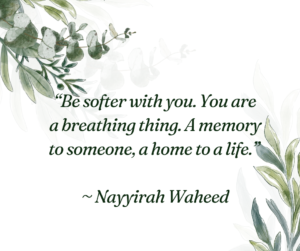Why Self-Compassion is Important
Over the last decade, there’s been a great deal of research showing how beneficial self-compassion is to our well-being. Individuals who are more self-compassionate tend to have greater happiness, life satisfaction and motivation, better relationships and physical health, and less anxiety and depression. They tend to be more resilient in the face of stressful life events, like divorce, illness, and even trauma from combat.
Many of us have been conditioned to view compassion and vulnerability as weakness. We’ve been taught to deal with challenges and difficult times with a “stiff upper lip” mentality. However, ignoring these experiences, or judging and criticizing ourselves about our shortcomings and failures, will only lead to more suffering.
Self-compassion offers a healthier way to cope. Being compassionate towards yourself means you’re kind and understanding towards yourself in difficult moments. Just like a good friend would be.
However, self-compassion offers a healthier way to cope. Being compassionate towards yourself means you’re kind and understanding towards yourself in difficult moments. Just like a good friend would be. Accepting your human condition – your limitations, mistakes you’ve made, losses you’ve endured – with an open heart is how to begin showing compassion to yourself and the world around you.
When we are mindful of our struggles and respond to ourselves with compassion, kindness, and support in times of difficulty, things start to change. We can learn to embrace ourselves and our lives, despite inner and outer imperfections, and provide ourselves with the strength needed to thrive.

According to one of the world’s leading experts on self-compassion, Dr. Kristin Neff, there are three core elements of self-compassion she lists on her website, which I’ve listed below:
1. Self-Kindness vs. Self-Judgment
Self-compassion entails being warm and understanding toward ourselves when we suffer, fail, or feel inadequate, rather than ignoring our pain or flagellating ourselves with self-criticism. Self-compassionate people recognize that being imperfect, failing, and experiencing life difficulties is inevitable, so they tend to be gentle with themselves when confronted with painful experiences rather than getting angry when life falls short of set ideals. People cannot always be or get exactly what they want. When this reality is denied or fought against suffering increases in the form of stress, frustration, and self-criticism. When this reality is accepted with sympathy and kindness, greater emotional equanimity is experienced. (1)
2. Common Humanity vs. Isolation
Frustration at not having things exactly as we want is often accompanied by an irrational but pervasive sense of isolation – as if “I” were the only person suffering or making mistakes. All humans suffer. The very definition of being “human” means that one is mortal, vulnerable, and imperfect. Therefore, self-compassion involves recognizing that suffering and personal inadequacy are part of the shared human experience – something that we all go through rather than something that happens to “me” alone. (1)
3. Mindfulness vs. Over-Identification
Self-compassion also requires taking a balanced approach to our negative emotions so that feelings are neither suppressed nor exaggerated. This equilibrated stance stems from the process of relating personal experiences to those of others who are also suffering, thus putting our own situation into a larger perspective. It also stems from the willingness to observe our negative thoughts and emotions with openness and clarity, so that they are held in mindful awareness. Mindfulness is a non-judgmental, receptive mind state in which one observes thoughts and feelings as they are, without trying to suppress or deny them. We cannot ignore our pain and feel compassion for it at the same time. At the same time, mindfulness requires that we not be “over-identified” with thoughts and feelings, so that we are caught up and swept away by negative reactivity. (1)
Check out this short 4-minute video, The Power of Self-Compassion, by Dr. Kristin Neff and Chris Germer for a peek into their transformative course.
“This is a moment of suffering. Suffering is part of life. May I be kind to myself in this moment. May I give myself the compassion I need.” ~Kristin Neff
I’ve experienced the benefits of self-compassion in my own life for the past ten years. First, let me give you a little insight into my life before I learned about mindfulness. I was diagnosed with Systemic Lupus and Sjogren’s Syndrome in 2005. My sons were still in grade school and full of energy and I worked a demanding full-time job in the financial industry. Being a supportive wife to my musician husband who had a full schedule of weekend gigs on top of his full-time job was also important to me. It was a lot to keep up with and I wasn’t very kind to myself. For five years, I allowed the bully who was taking up residence in my head to control my life.
I’d berate myself for feeling exhausted and in pain all the time. My mind was constantly whirring with all the “shoulds” and to-do’s I wasn’t keeping up with because I just didn’t have the energy to get it all done. The stress of the “just keep going” mentality was wearing on me. I’d push myself to the limit and inevitably experience a flare-up of symptoms, which landed me in my doctor’s office and usually meant I’d be laid up for a few days or more. I’d feel guilty about not being able to meet whatever needs my family had at that time and the financial burden my illness was putting on us. It was a vicious cycle.
What I Learned From Practicing Self-Compassion
Fast forward to 2010 when I finally went to a counselor to help cope with my illnesses and the effect they were having. By that time I had begun meditating (transcendental) but hadn’t heard of mindfulness. My counselor suggested I give mindful meditation a try. I have to be honest here, I wasn’t a fan at first. I had a lot of difficult stuff come up and I didn’t feel like it was helping. But with my counselor’s gentle encouragement, I kept practicing.
I learned that it’s ok to take care of myself first sometimes. Even more important, I learned that in order to care for those I love, I must take care of myself. As the old saying goes, “You can’t pour from an empty cup.” I learned it’s ok to say “No” to something that you don’t want to do. I learned it’s ok to spend time doing things you do enjoy and that it adds value and quality to your life.
Eventually, I began to notice I was able to hold myself in a kind and understanding space when faced with difficult choices or was just experiencing strong symptoms. I learned that it’s ok to take care of myself first sometimes. Even more important, I learned that in order to care for those I love, I must take care of myself. As the old saying goes, “you can’t pour from an empty cup.” I learned it’s ok to say “no” to something that you don’t want to do. I learned it’s ok to spend time doing things you do enjoy and that it adds value and quality to your life.
Most importantly, I learned to take care of my mind as well as my body. This is an extremely compassionate act. Being mindfully aware of what you consume and what you do with your energy is an important part of self-compassion. Fill your mind and body with positive things (healthy foods, wisdom, etc), and notice how they make you feel. Really connect with the physical sensations they evoke.
Not to say that I don’t have my missteps. I still struggle at times. After all, none of us is perfect. However, accepting my limitations and true nature has allowed me to embrace myself and my life in a compassionate way. And, the more compassionate I am with myself, the more compassionate I am with others. Having compassion for yourself has a transformative ripple effect that impacts almost every area of your life and the lives around you. So in a greater sense, it can change the world.
Here’s a 10-minute guided practice for you to try the next time you need a little self-compassion.
References:
Definition of Self-Compassion , Dr. Kristin Neff, Self-Compassion.Org

